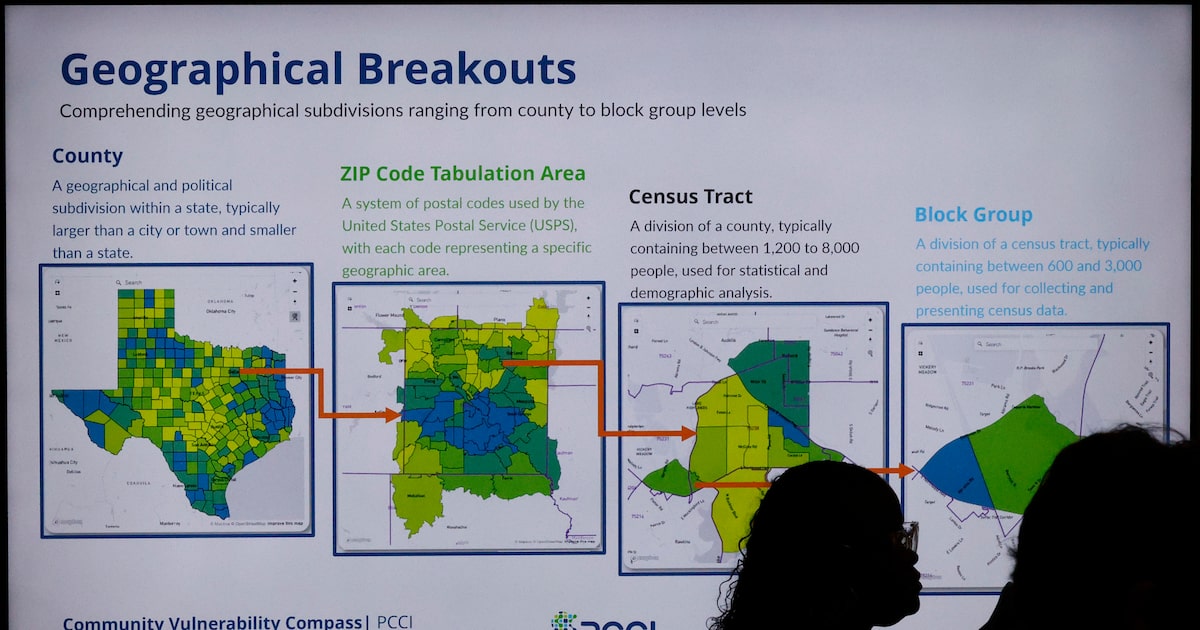North Texas nonprofits are using an innovative database to understand and address different barriers to well-being in the community.
The Data Capacity Building Initiative by the United Way of Metropolitan Dallas and the Parkland Center for Clinical Innovation (PCCI) allows nonprofits to see where help is needed most, using the Community Vulnerability Compass.
Over the next five years, the initiative will give United Way’s 200-plus nonprofit partners comprehensive data to inform their work.
Related
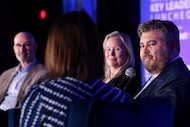
Breaking News
United Way has used the tool for the past four years, and the organization is now extending the resource to its partners to help them expand the impact of their services, said Jennifer Sampson, McDermott-Templeton president and CEO of United Way of Metropolitan Dallas. (United Way of Metropolitan Dallas supports The Dallas Morning News’ Future of North Texas initiative.)
United Way officials said these partnerships will help it in achieving its Aspire United 2030 Community Goals.
United Way launched the initiative five years ago to increase the share of third grade students reading on grade level by 50%, to grow the number of young adults earning a living wage by 20% and to bolster the number of people with access to affordable health insurance to 96%, Sampson said.
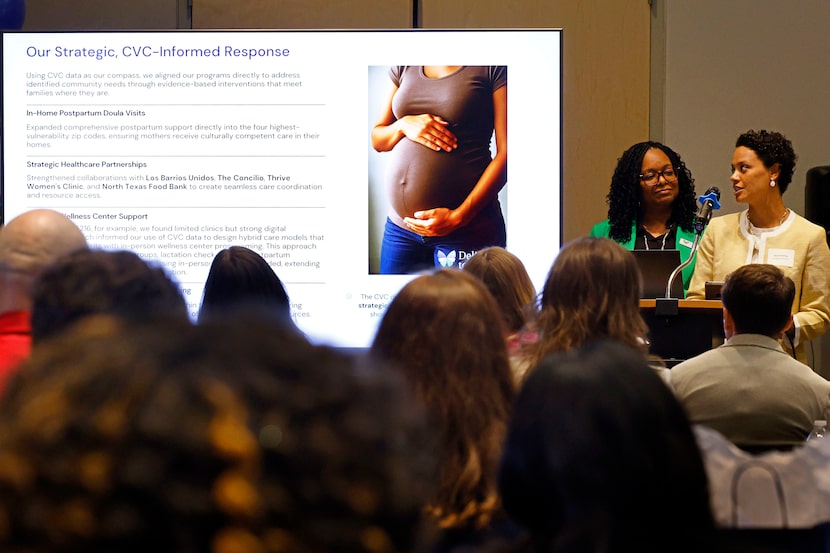
Sasha Kehoe of Delighted to Doula (right) speaks as Prinscilla Moore, CEO and founder of Delighted to Doula, looks on during a presentation at the United Way of Metropolitan Dallas office, Wednesday, Oct. 15, 2025, in Dallas.
Chitose Suzuki / Staff Photographer
The Community Vulnerability Compass provides a comprehensive look at 26 different factors that impact one’s well-being, such as health insurance, educational attainment, housing conditions, transportation and income, said Lance Rather, senior director of product and strategic partnerships at PCCI.
The compass also tracks this data at the ZIP code, census tract and block-group level, which has allowed the nonprofits to identify 100,000 additional Dallas County residents that were never seen at the ZIP code level alone, Rather said.
Community impact
“It’s provided a road map for equity, sustainability and measurable impact in Dallas County,” said Prinscilla Moore, CEO and founder of Delighted to Doula, a nonprofit postpartum doula service.
By using the data, Delighted to Doula increased postpartum visit attendance by 45% in areas with high barriers to maternal health care, Moore said.
The nonprofit also identified additional ZIP codes that could benefit from the organization’s service, and it expanded service for culturally competent care, particularly for Spanish-speaking communities, she said.
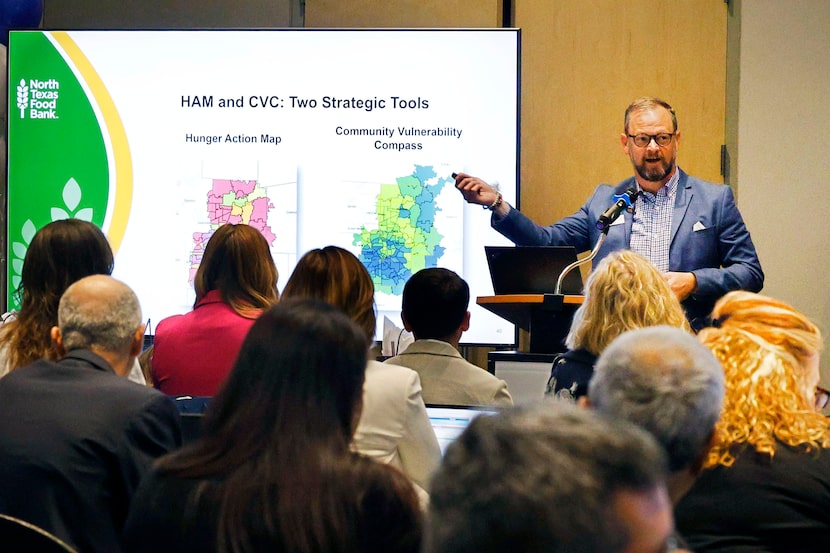
Shawn Martin, strategic initiatives manager at the North Texas Food Bank, presents at an event at the United Way of Metropolitan Dallas office, Wednesday, Oct. 15, 2025, in Dallas.
Chitose Suzuki / Staff Photographer
Shawn Martin, strategic initiatives manager at the North Texas Food Bank, said United Way’s database helps the food bank understand more about the people living in its services areas — their demographics, challenges and specific needs — so the nonprofit can tailor programs and outreach more effectively.
Joleen Bagwell, chief development officer for the LBU Community Clinic, said the tool makes it easier for her nonprofit to gather information for grant applications and potential new clinic locations.
Daria Lester, senior director of workforce and community engagement at Ascend Dallas, said her nonprofit uses the data to expand its reach and impact.
Janna Burns, executive director of teacher development and school support at the Young Women’s Preparatory Network, said the network uses the data to strengthen the organization’s story.
“We can say definitively that nine out of every 10 of YWPN’s Dallas County students live in neighborhoods in the top quartile of vulnerability for literacy and educational attainment — yet 100% graduate high school and are accepted to four-year colleges,” Burns said.
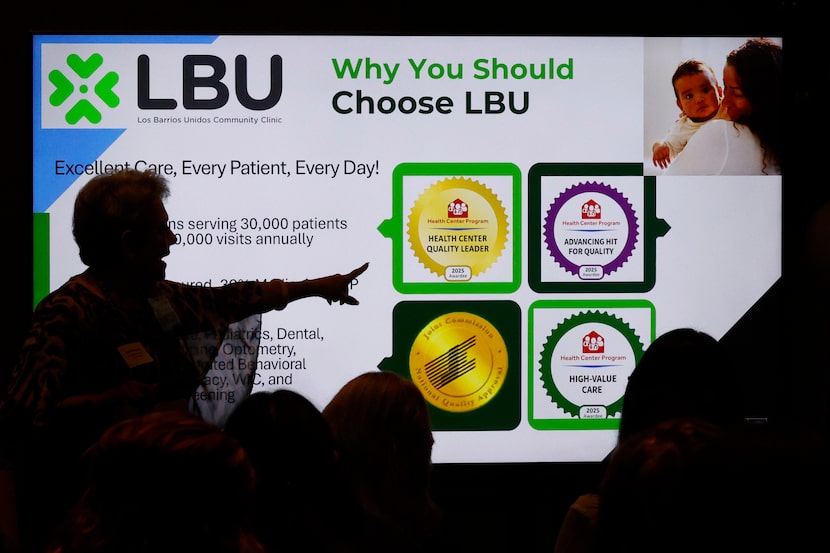
Joleen Bagwell, chief development officer for the LBU Community Clinic, shows how United Way’s tool helps her organization during an event at the United Way of Metropolitan Dallas office, Wednesday, Oct. 15, 2025, in Dallas.
Chitose Suzuki / Staff Photographer
Those stories are only some of the examples of impact shared by the nonprofits and others during a recent United Way meeting.
Maria MacMullin, chief impact officer for Genesis Women’s Shelter & Support, also shared her future hopes for the initiative.
MacMullin said she’s working with United Way and PCCI to identify data sets that reveal “the direct intersectionality” between domestic violence survivors who may have traumatic brain injuries and the other vulnerabilities that they experience in the community.
“That data will help us not just assert that we know these experiences exist, but we can validate them,” MacMullin said.
This reporting is part of the Future of North Texas, a community-funded journalism initiative supported by the Commit Partnership, Communities Foundation of Texas, The Dallas Foundation, the Dallas Mavericks, the Dallas Regional Chamber, Deedie Rose, Lisa and Charles Siegel, the McCune-Losinger Family Fund, The Meadows Foundation, the Perot Foundation, the United Way of Metropolitan Dallas and the University of Texas at Dallas. The News retains full editorial control of this coverage.
